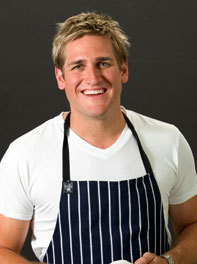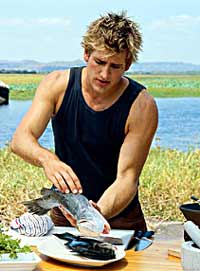Copyright ©2008 PopEntertainment.com. All rights reserved.
Posted:
March 8, 2008.
In America, Curtis Stone is popularly known as The Take Home
Chef (on The Learning Channel); yet this Aussie and his cooking talents
are internationally known.
Before even setting foot in the New World, he was top dog at some
of the top Australian restaurants, making his cuisine career debut at age
eighteen.
"We're a country full of convicts," he says of his native land.
"That's how our country started off. We break every rule that we possibly
can. There are no rules in Australian food."
With the no-rule rule in mind, he hosted the hit Australian
cooking show Surfing the Menu, as well as Dinner in a Box,
Good Food Live and Saturday Kitchen for the BBC.
It was in London where he scored some major prestige, cooking
alongside the revered Marco Pierre White at the Café Royal and Mirabelle. He
quickly moved on to head chef at the ritzy Restaurant 301.
However, none of those impressive credits prepared him for his
American debut. The Take Home Chef, based in Los Angeles, puts
a Cuisinart-style spin on the usual stay-in-the-kitchen cooking show. In it,
Curtis actually picks up a woman in a supermarket, takes her home, and cooks
for her.
If cooking is an expression of love, than this is Love, American
Style. However, the show does not sink into a greasy sink full of suds.
It's wholesome and fun; Curtis usually winds up cooking for the unsuspecting
woman's husband, boyfriend or family. Bellies and hearts are full. Everybody
walks away with their pants unbuttoned, but not in the way you're thinking.
"I was in Australia when the Discovery Channel came up with the
idea," he says. "They phoned me up and they said, 'look, we've got an idea
for a show. You'd be cooking and doing all the things you are good at, and
we'd have you walking around grocery stores. And I thought to myself, 'hold
on a minute. You're asking me whether or not to do a job where I get paid to
go into grocery stores and chat to girls. It sounded like a dream job."
 The risk paid off, as Take Home Chef has become quite the
hit, on a channel not famous for its cooking shows, and in a genre that in
the last few years has become a bit overcrowded. Setting yourself apart is
what gets you ahead when becoming a TV cooking icon, and it's not as easy as
separating an egg.
The risk paid off, as Take Home Chef has become quite the
hit, on a channel not famous for its cooking shows, and in a genre that in
the last few years has become a bit overcrowded. Setting yourself apart is
what gets you ahead when becoming a TV cooking icon, and it's not as easy as
separating an egg.
"It was awkward at first, to be honest," Stone says of the show's
unusual concept, "but it's a great introduction to your culture. I've never
been to the States before, so for me it was a completely new experience, and
an amazing one. We've had so many different types of people on the show. I
guess we've done about 140 episodes so far."
Most all of them memorable, but some more than others.
"I think the most memorable was one lady who didn't have her stove
installed," he recalls. "We actually got to the house, and by the time we
worked out where the kitchen was, we realized that she didn't have the stove
installed. It was an interesting challenge. We actually had to put it in
ourselves. There was no way around it."
However, quick thinking and improvisation are two qualities that
make a master chef. Curtis was originally headed for a business education
and life in an office, but his heart was in cooking, and he followed it.
"We're quite young when we finish high school and then we have to
make a decision," he says. "Do I go to university and pursue an education or
do I do something with my hands or do I follow my heart? There are a million
different ways that you can do it. But I decided to go to university and I
was there for a little while and I kind of enjoyed it, but I always loved
cooking. I loved being around food. I made the decision to start an
apprenticeship and I did that for four years and I've never looked back. I
just absolutely love it."
It must be in the blood. He comes from a cooking family.
"My mum was a really good cook and my granny was as well," he says.
"My grandma used to make this beautiful fudge. She was from Yorkshire, and
she was always in the kitchen. Aussies are pretty laid back. We're pretty
relaxed in the way that we approach food. We're lucky in that most of our
biggest cities are on the coast, so we're surrounded by seafood and we're
sort of blessed with really good ingredients. We're a little bit like
America, but we probably lean more toward seafood, I guess."
For Americans who are about to venture into the kitchen, and not
just to pick up the phone to call Domino's, Stone has some very practical
and useful advice.
"You just start off really simple," he says. "The best way to get
going with food is to experiment with really simple ingredients. You don't
have to be a good cook to be able to put good food on the table.
"You go down to a nice market and get yourself, let's say a good
quality mozzarella cheese and some nice, fresh tomato. Make sure the tomato
is really ripe, and make sure the cheese is really tasty. All you have to do
is chop up the tomatoes and mix it with a good quality olive oil and maybe
some balsamic vinegar. And then you tear off the mozzarella cheese and put
that over your tomatoes, and a little bit of fresh basil and you've got this
gorgeous salad that you can serve as an appetizer or a side dish or even a
bit more of a main event.
 "You haven't had to really cook at all. It's a combination of
flavors and it builds your confidence. You do that a couple of times and
then you can take the next step."
"You haven't had to really cook at all. It's a combination of
flavors and it builds your confidence. You do that a couple of times and
then you can take the next step."
Talking about taking that next step, Stone regularly faces the very
thing that he himself finds the most challenging: cooking for a stranger.
"I think it's all about what sort of atmosphere you want to
create," he says. "You're not too sure where they come from and you're not
one hundred per-cent sure of what kind of atmosphere you're going for.
"I usually think a good way to start is to kick off with something
that gives many people many options. So you start with an antipasto platter,
for instance, and you've got some chilled meats and some nice vegetarian
alternatives as well. You might have some marinated artichokes and a
couple of nice cheeses and breads. And you sort of chill people out. Let
them start picking and sharing and passing things around."
While he is allowing America to pass his offerings around, he feels
that our country is at the beginning of something beautiful.
"I've got an opinion that America is on the verge of a huge food
revolution," he says. "Everybody is super-interested in food, especially in the last five
or six years. Gone are the days when spaghetti and meatballs and meatloaves
are the only things that households can cook. Those amazing things always
have a place in the American kitchen, don't get me wrong. But I think that
people are experimenting with different types of cuisines and different ways
of cooking. They are making food more of an important part of their lives."
Now that's
a positive outlook, at a time of bleak economic days for this country. Home
cooking has become a a frugal alternative to take out. You may not be able
to take that to the bank, but at least you can take it home.
Email
us Let us know what you
think.
Features
Return to the features page.

Copyright ©2008 PopEntertainment.com. All rights reserved.
Posted:
March 8, 2008.